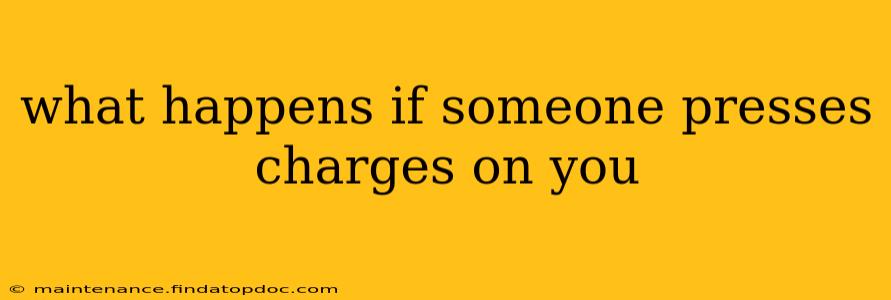What Happens If Someone Presses Charges? A Guide to the Legal Process
Being on the receiving end of criminal charges can be a daunting experience, filled with uncertainty and anxiety. Understanding the process is crucial to navigating this difficult situation. This guide will outline the general steps involved when someone presses charges, emphasizing that the specifics can vary significantly based on location, the severity of the alleged crime, and other factors. It's crucial to consult with a legal professional for advice specific to your circumstances.
What Does "Pressing Charges" Actually Mean?
The term "pressing charges" is often used colloquially. It generally refers to the formal initiation of criminal proceedings against someone. This typically involves a victim or witness reporting an alleged crime to law enforcement, who then investigate the incident. The police, after their investigation, will decide whether to arrest the accused and file charges with the prosecutor's office. The prosecutor, not the victim, ultimately decides whether to proceed with the case. The victim's role is primarily to provide information and testimony.
What Happens After Charges Are Filed?
Once charges are filed, the process unfolds in several stages:
1. Arrest and Booking: If the police believe there is sufficient evidence, they may arrest the accused. This involves taking the individual into custody, informing them of their rights (Miranda rights in the US), and transporting them to a police station for booking. Booking includes fingerprinting, photographing, and recording personal information.
2. Initial Appearance/Arraignment: The accused will appear before a judge shortly after arrest. At this initial appearance, the charges will be formally read, the accused will be informed of their rights (including the right to an attorney), and bail may be set (depending on the severity of the crime and the defendant's risk of flight).
3. Discovery: Both the prosecution and the defense gather evidence. The prosecution must disclose evidence to the defense. This includes witness statements, police reports, forensic evidence, and anything else relevant to the case.
4. Plea Bargaining: Many criminal cases are resolved through plea bargaining, where the defendant agrees to plead guilty to a lesser charge or to a reduced sentence in exchange for avoiding a trial.
5. Trial: If a plea agreement isn't reached, the case proceeds to trial. This involves presenting evidence, calling witnesses, and having a jury (or judge, in some cases) determine guilt or innocence.
6. Sentencing: If the accused is found guilty, sentencing occurs. The judge determines the appropriate punishment, which can range from probation to imprisonment, fines, and restitution to the victim.
What If I'm Accused of a Crime?
If you're accused of a crime, it's crucial to:
- Remain silent: Anything you say can be used against you. Do not talk to the police without a lawyer present.
- Contact a lawyer immediately: An attorney can advise you of your rights, protect your interests, and represent you throughout the legal process.
- Gather evidence: If you have evidence that supports your case, collect and preserve it.
What are the different types of charges?
The types of charges filed will depend entirely on the nature of the alleged crime. These can range from misdemeanors (less serious offenses) to felonies (more serious offenses) and everything in between, each carrying vastly different potential consequences.
What if the charges are dropped?
Charges can be dropped for various reasons, such as insufficient evidence, witness unreliability, or prosecutorial discretion. If charges are dropped, the accused is legally considered innocent.
This information is for educational purposes only and should not be considered legal advice. The legal process is complex, and the specifics can vary greatly depending on jurisdiction and individual circumstances. Always seek legal counsel from a qualified attorney if you are facing criminal charges.
